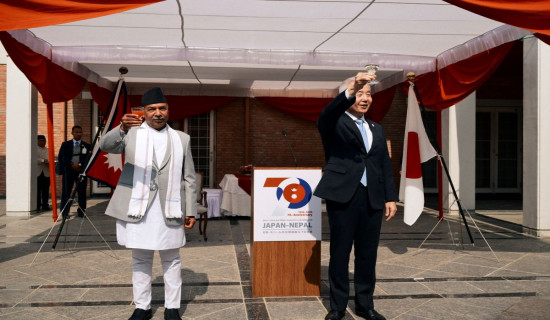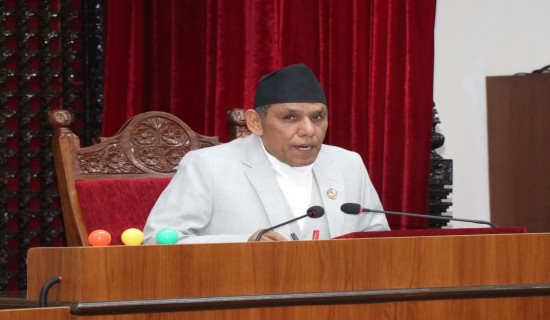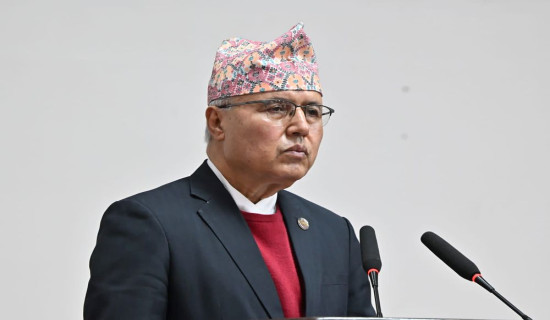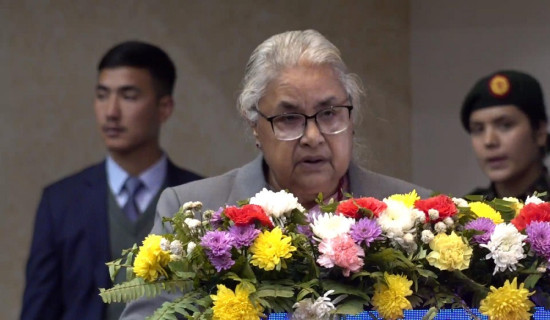- Thursday, 12 February 2026
Dharan Incident, Ahuti and Deontology
Shalik Subedi
 Teaching a class on human rights at the university,
I found myself engaged in a thought-provoking discussion centered on the
Deontology of Immanuel Kant. As I delved into the intricacies of Kant's
philosophy, one of my astute students posed a question that initiated a
captivating exchange. The question opened the door to exploring deontology,
categorical imperatives, and their distinction from utilitarianism, drawing on
the ideas of Kant, Jeremy Bentham, and John Stuart Mill.
Teaching a class on human rights at the university,
I found myself engaged in a thought-provoking discussion centered on the
Deontology of Immanuel Kant. As I delved into the intricacies of Kant's
philosophy, one of my astute students posed a question that initiated a
captivating exchange. The question opened the door to exploring deontology,
categorical imperatives, and their distinction from utilitarianism, drawing on
the ideas of Kant, Jeremy Bentham, and John Stuart Mill.
"Sir, what exactly is deontology?" the student inquired. It was Ahuti, whom he recognized as Sarki, that answered, "Yes, I am Sarki." The ensuing dialogue touched upon the caste system, and I responded with a counter-question about the role of pride in perpetuating inequality. Ahuti astutely noted that pride in one's caste only perpetuates the caste system's existence and that Kant's insights emphasize the need for limited government, constitutional state, and liberal democracy to dismantle such inequality.
In contemplating the virtues of liberal democracy, I
highlighted its advancement over direct democracy. Unlike the mere rule of the
majority, liberal democracy values the rights and respect of all individuals.
This brought to mind the wisdom of Kant, who stressed the importance of
treating individuals as ends in them and not as means to an end. The essence of
Kant's categorical imperative resonated – the principle that one should act in
such a way that their actions could be universalized without contradiction.
Recalling ancient philosophies, I invoked Mo Ji and
his “School of Moral Philosophy” in China, reflecting on Mencius' belief that “humans
are inherently good but require nurturing to manifest their goodness”. This
resonated with Kant's notion that individuals possess intrinsic worth and
dignity, thus deserving of moral consideration. I
remembered Buddha, Guru Govinda Singh, Krishna, Gita, Mundhum and Aakash Bhairav. I remembered the virtue
that none of them encouraged violence and denied retaliation. And I remembered Dharan too.
Diving deeper, my thoughts turned to the Dharan bull incident, an issue that transcended the boundaries of an isolated event. This incident provoked a larger discussion about race and religion. It was here that the relevance of Kant's concept of human dignity as the foundation of moral worth became evident. Kant's emphasis on treating others as ends in them aligns with the principles of equality and respect for all faiths, reflecting the essence of secularism.
The discussion then led to the dichotomy of
religion's origin – natural or man-made. Kant's philosophy finds a place here,
as he dissected the psychological constructs of religion within the framework
of positivism and constructionism. Kant's emphasis on moral autonomy resonates
with his belief in individuals' capacity to determine their actions based on
reason and duty rather than external dictates.
Immanuel Kant, the eminent German philosopher, had
strong disagreements with the utilitarian views of Jeremy Bentham and John
Stuart Mill. While Bentham and Mill championed the maximization of pleasure and
the pursuit of the greatest happiness for the greatest number, Kant's
deontology was anchored in the inherent value of actions themselves. Kant
believed that actions, driven by moral duty and guided by categorical
imperatives, hold intrinsic moral worth. Unlike utilitarianism, which evaluates
actions based on their outcomes, Kant's approach emphasizes the intentions and
principles underlying those actions.
Addressing a student's question about Kant's stance
on democracy and freedom, I drew a contrast between Kant's deontology and the
utilitarian perspectives of Bentham and Mill. While Mill and Bentham supported
limited democracy and the rule of the majority, Kant's ideology aligned with
unlimited democracy, focusing on individual rights and self-determination.
Kant's emphasis on moral principles guiding actions resonated with the idea
that every person should engage in morally upright behavior to build a just
society – echoing the essence of Vedic Sanatan Dharma and Krishna's teachings.
The conversation then took a philosophical turn,
delving into Kant's atheism, his advocacy for nature, and his opposition to
inhumane religious practices. Kant's belief in the moral law within and his
rejection of arbitrary authority aligned with the principles of justice,
equality, and freedom. His aversion to fanaticism and support for social
harmony echoed the concerns of today's societal dynamics, particularly in cases
like the Dharan incident.
It is clear that Kant's philosophy, rooted in moral
principles and human dignity, intersects with contemporary discussions on human
rights, equality, and the role of religion in society. His advocacy for limited
government, constitutional state, and liberal democracy echoes the need for
structures that uphold individual rights while fostering social harmony. In a world
where spirituality can be exploited for nefarious purposes, Kant's emphasis on
moral autonomy and rational action remains as relevant as ever.
In conclusion, the classroom discussion ignited by a
student's question encompassed a journey through Kant's deontology, contrasting
it with utilitarianism's principles advocated by Bentham and Mill. The dialogue
further ventured into the complexities of caste identity, the wisdom of ancient
philosophies, and the dynamics of modern religious controversies. As we
navigated these intersections, Kant's philosophical insights served as a
guiding light, emphasizing the importance of moral duty, individual dignity,
and the pursuit of a just and harmonious society.
That's why I say. Let us read the social harmony that is the foundation of religion, not the religious extremism that stands on the foundation of iniquity. Let's focus on achievement, not revenge. (saliksubedi.com)













